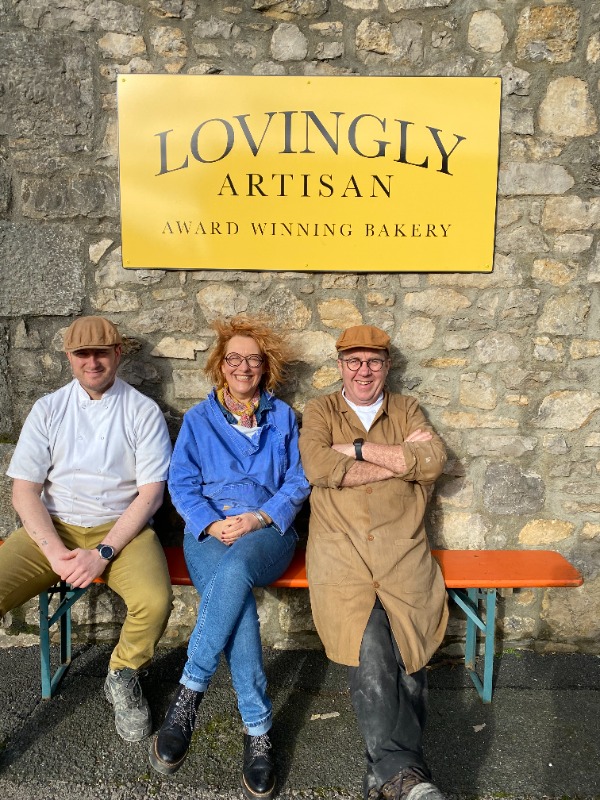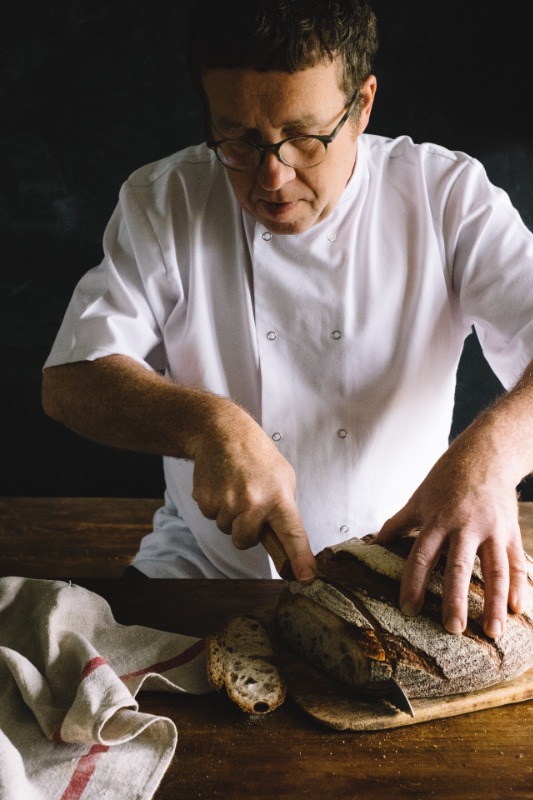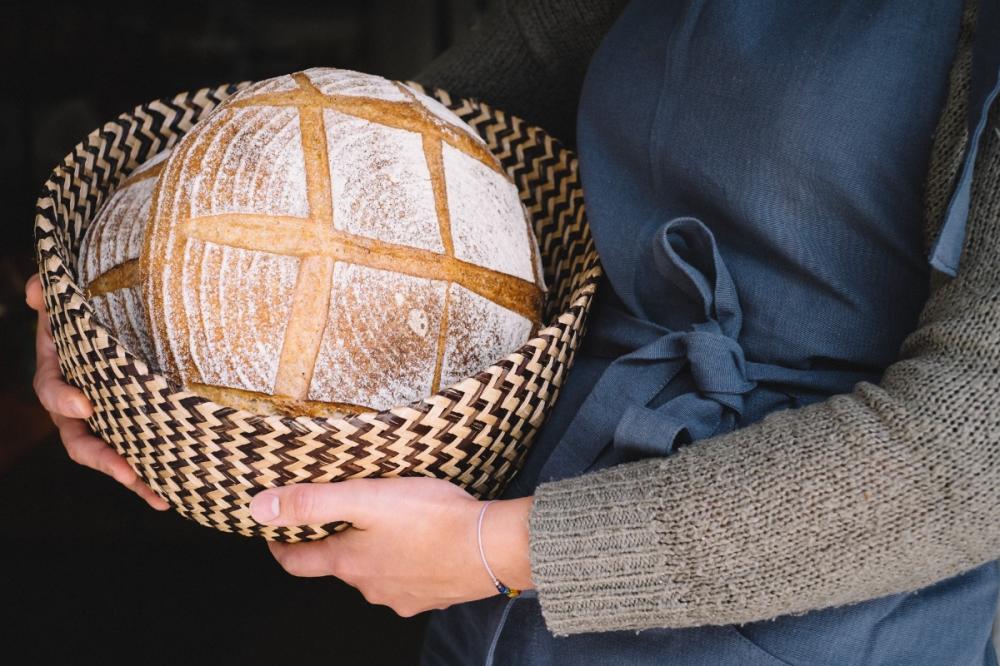search
date/time
 | Cumbria Times A Voice of the Free Press |

Andrew Palmer
Group Editor
2:00 AM 28th May 2022
lifestyle
The Weekender: Lovingly Artisan The Secret Behind Sourdough

(L-R) Dean Fletcher., Catherine Connor (Aidan’s wife) and Aidan Monks
Already my taste buds are working overtime at the thought! Aidan and his team craft handmade artisan breads at the two bakery sites. Each loaf is made using three simple ingredients, water, salt, flour and a little magic here and there in the form of Marmite, Mrs Kirkham’s Lancashire Cheese, Chilli, Kalamata Olives and Ancient Grains bread.

Aidan Monks
Aidan goes on the explain "There are some fairly significant reasons as to why artisan made sourdough bread is healthier compared to its mass manufactured cousins.’’
He adds: ‘’Most of us probably think of the good old supermarket sliced loaf when we talk about bread. But that’s not what Aidan’s about, his breads are so far removed from the mass-produced factory manufactured loaves many pick up as part of their weekly shop. In fact they are almost completely the opposite.

I can see I’m certainly going to learn a lot during this interview, especially plenty about the health benefits associated with sourdough breads made with ancient grains.

Sunflower Seed Danish Rugbrød

I’m left wondering if that is the main reason why there’s been a rapid increase in the popularity of artisan breads and baking.
But Aidan has a slightly different take, he believes that we’re learning more about artisan foods and breads in particular, through mediums such as Instagram, where images and videos of artisan made produce, ethically grown produce are tapping into people’s desire to be healthier, to be more supportive of their local producers and above all be more conscious about what they are eating, where it comes from, who has made it and the impact it has on the planet.

Lovingly Artisan Bread Shop
Aidan explains: “Meeting Andrew gave us a real grounding at the very start of our business, and we felt very much we were part of an entire discovery process. You see ancient grains have very different properties to modern wheats, the taste, texture are all different. Then when you add in things like rye into the mix it starts to get really interesting. Rye is high in antioxidants, and it adds addition flavour and texture too, all of which not only enhances the breads you create but also increases their health benefits as well.’’
Sourdough bread making has been around for thousands of years it’s really nothing new, but we wouldn’t use any other process when crafting out breads with Andrew’s amazing produce. For us it’s all about respect; for the ingredients we use, the people who have taken the time to grow those ingredients, the quality of the bread we create and ultimately thepeople who buy and eat the breads we create.

.jpg)
The beauty of artisan baking, according to Aidan is that a baker using that medium can work with different flours, not necessarily wheat based, there are other grains available, like Einkorn, Emmer and Spelt, all of which bring very different properties to the breads they are baked into. There are no half measures, ultimately you need to know how to work with these ingredients to get the best out of them and that can be a process of trial and error.
He explains: ‘’Einkorn, Emmer and Spelt are known as ancient grains, why because they’ve been around for thousands of years. As flours they essentially have much shorter protein strands, which makes it more difficult to turn them into an elastic dough. For example Emmer when it’s milled and turned into flour, looks and feels a bit like semolina, but to get the best out of it you need to soak it. How do you find that out? It involves lots of research. All of which takes time, but once you’ve gathered all of the relevant knowledge it all begins to slot into place, and you end up creating amazing breads.’’
.jpg)
Sourdough breads are easily digestible; they are both probiotic and prebiotic making it a valuable addition to the human gut biome. It’s also genuinely low GI, even properly made white sourdough is low in GI. Alongside that there’s also no significant insulin spike when sourdough breads are consumed, compared with modern breads, which is all down to the way sourdough’s lactic fermentation adjusts the starch in the bread.”

Aidan Monks

Spelt, Golden and Brown Linseed Seed Bread
Aidan can see me looking puzzled and second-guesses me. “Sourdough stays fresh for a long time, which means we can send bread anywhere in the country. We ship our freshly baked breads on the day they are baked, wrapped in recyclable waxed bags, packed in a specially designed recyclable box, (which also doubles up as a handy bread bin), to its intended destination where it can then either be frozen for later use of consumed.’’
The following day a box arrives, brim full delicious breads, each wrapped in waxed paper. Yes, I did freeze a couple of loaves and the rest were eaten there and then. (The frozen loaves were deliciously tasty and really enjoyable when I came to use them a week or so later).

Malted Barley
Anyway I’d better get on… there’s a slice or two of warm toast calling me… mmmm
https://lovinglyartisan.com/
Also by Andrew Palmer...
Classical Music: Brahms & BusoniClassical Music: Chopin Obsession By Marina ArsenijevicClassical Music: Tchaikovsky & Korngold String SextetsClassical Music: Gabríel ÓlafsThe Value Of Luck: In Conversation With Martin VenningMore in this series...
The Weekend Interview: Mel Hird The Voice Of ReasonWeekend Interview: Discovering Your Unique Blueprint To Food IntoleranceTennis Superstar Jordanne Whiley MBE Talks Tokyo ParalympicsThe Willard White Interview: A Secret Rapper?Weekend Interview: Pork Pies - How Do You Eat Yours? Warm, Cold, With Brown Sauce Or Something Else?Weekend Interview: Ben Crick Wielding His Baton Over A New OrchestraInterview: Traditional Balsamic Vinegar As A Symbol Of ExcellenceWeekend Interview: Andrew McCloy Chair National Parks EnglandWeekend Interview: The Joys Of Our Hay MeadowsWeekend Interview: From Bump To Baby. Breaking Down Taboos Of PregnancyWeekend Interview: A Day In The Life Of ABP Humber’s Marine Engineers